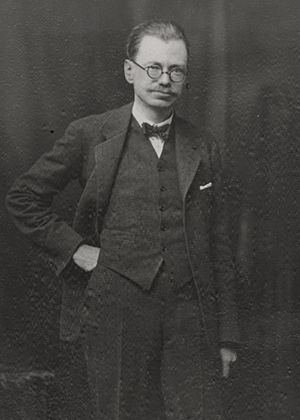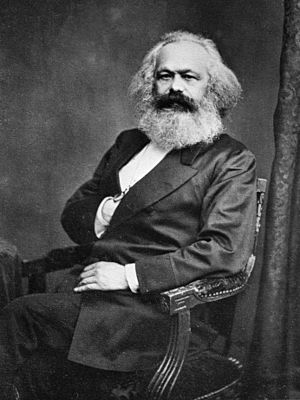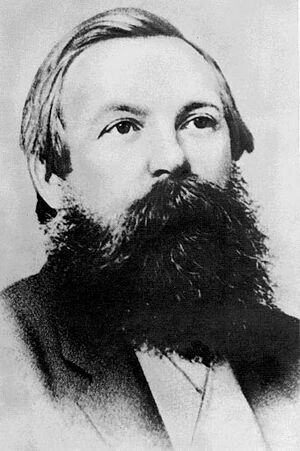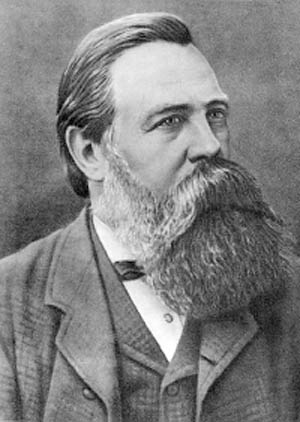Marxism facts for kids
Marxism is a group of political and economic ideas. These ideas are mostly based on the writings of Karl Marx and Friedrich Engels. Their thoughts have been very important in many countries around the world.
Marxism has shaped other political ideas, like social democracy. Some people believe Marx's ideas can be reached through what he called 'democracy'. This means using the usual political systems to make changes.
Contents
What Marxists Believe About Modern Communism
Many Marxists say that what some countries call "communism" today is not true communism. They believe that countries like the Soviet Union (in the past), People's Republic of China, Cuba, and Vietnam actually use different kinds of capitalism. Often, their industries are heavily owned by the state.
A thinker named Tony Cliff was a big supporter of this idea. He wrote that places like the Soviet Union were "State-Capitalist." This means the state acted like a big capitalist owner.
Not all communists or Marxists agree on this. But many strong supporters of Marxism believe:
- With socialism, workers should have democratic control over money decisions. They should also have social justice.
- An economy should make goods and services based on what people need.
- Socialism will eventually change into communism. This will happen when capitalism is gone.
The Working Class and the Capitalist Class

Marxism teaches that people are divided into different classes. These classes are based on the kind of work they do.
Capitalism vs. Workers
Most people are called "workers." They work in factories, offices, or farms for money. They belong to the "working class" (also called the "proletariat").
Another group, much smaller than the working class, are the "capitalists" (or "bourgeoisie"). They own the factories, land, and buildings where workers do their jobs. They also own the tools workers use. Marx called capitalists the "Ruling Class." This is because they live off the work of others. He also said that capitalists control the government, army, and courts.
In Marxism, Capital means the "means of production" (like factories and tools) and money. Capitalists invest this capital to make a "profit" or gain more capital.
Most workers are paid by companies owned by capitalists. The capitalist pays the worker for their time. The capitalist buys a period of time from the worker. The worker then uses this time to labor for the capitalist.
Marxist thinking says this is how capitalists make extra money from a commodity (a product). The capitalist uses the worker's time as much as possible. The capitalist sells the product the worker made for a certain price. The capitalist makes more money by paying the worker less than the product is worth.
This is called exploitation of labor. It means:
- The worker is not paid what their labor was truly worth.
- The capitalist keeps the extra money that was not paid to the worker.
Here is an example: Jane makes shoes for Michael, who owns a shoe factory. Jane makes 60 pairs of shoes a day. Michael pays Jane $20 a day. He sells each pair of shoes for $2. So, he makes $120 a day from Jane's work. After paying Jane $20, he has $100 left. He also pays $60 for materials and $10 for factory costs. So, he gets $30 profit.
This extra wealth is called "Profit" or "Surplus Value." Jane makes 60 shoes, but she only gets paid the value of 10 pairs. For the other 50 pairs, she is making money for her boss. Her work makes him richer.
Marxism sees this Surplus Value, or Profit, as the exploitation of labor. This exploitation lets the smaller class (capitalists) live without working. Meanwhile, the larger class (workers) must work for capitalists to survive.
Marxism says that factories, tools, and workplaces cannot create new value by themselves. They are like a blueberry bush. The bush has no value on its own. People must create value by working. For example, someone picks blueberries all day. Those blueberries can now be traded or eaten because of the work put into picking them.
Class Struggle
Marxist thinking says that capitalists and workers are always struggling. This is called "Dialectical Materialism." It means that history is a story of conflict between classes. Different classes with different goals argue or fight. This fighting leads to social change.
Marxism says capitalists must exploit workers as much as possible. They try to keep wages as low as they can. Capitalists do this to make the most profit for themselves, as quickly as possible. Workers, however, must fight to keep their wages up. They also try to keep the "rate of exploitation" low. This helps them live more peaceful lives. This is what Marxism calls "Class Struggle." It is the fight between workers and their bosses for their own gain.
Marxists believe that all of human history has been divided by economic classes. For example, in feudal society (a medieval society with feudal Lords), the ruling class got wealth from peasant farmers. But as peasants demanded more, small shopkeepers and tradespeople appeared. These people formed guilds and hired workers. These events helped create capitalism.
In this way, Marxists believe that history moves forward because of class struggle. They think that communism (or socialism) will come from this struggle. Just like capitalism came from earlier struggles. They also believe that capitalism will lead to communism. This will happen as the workers' struggle becomes more revolutionary.
Materialism
The main idea of Marxist thinking is called Materialism. Materialism is a philosophical view. It says that communities grow from the "ground up." It means that "higher" parts of culture (like art, manners, and religions) are based on "lower" parts of life. These lower parts include having enough food and shelter. They also include who has money and how they get it.
Changes in the "higher" parts of culture (called the "Superstructure") are often linked to changes in the "lower" parts of life (called the "Base"). For example, in medieval times, people thought "honor" and duty to powerful people were very important. Today, in Western countries, many people see ambition as more important. This is because in medieval times, people worked for lords who needed them for work and war. Today, people work more independently. Our society lets some people move from being poor to being rich. So, what people see as good depends on how rulers get value from their workers.
A "Classless Society"
Marxism notes that in earlier times, we lived under rulers who owned everything. Then, we lived under lords who owned land with workers on it. In Marx's time, governments allowed many people to own property. Marxists believe we will eventually move to a society where everyone owns everything together. This will be called socialism.
Marxists believe that human society has always been shaped by economic forces. This means each society is formed by its "mode of production." Marxists think that humans' ability to make goods and services today means people can move beyond class conflicts.
Many Marxists believe there will always be revolts and, with the right conditions, revolutions. In these revolutions, workers will fight capitalists and eventually win. During this, they will set up a socialist "workers' state." This is a government where workers rule society. This state will be temporary. Its job will be to take power from capitalists. This will continue until all capitalist countries are defeated. Then, social classes will no longer exist.
Marxists believe that if the working class becomes the ruling class, they will destroy the basis for class society. This basis is private property. In this "classless society," no social classes will be in conflict. There will be no government anymore. The state will not be needed. The world will have no borders. There will be communes around the world. Workers will organize the making of goods and services based on what people need, not just for profits.
Related pages
Images for kids
-
Fidel Castro at the United Nations General Assembly in 1960.
-
Hugo Chávez casting a vote in 2007.
-
Xi Jinping, leader of the Chinese Communist Party since 2012.
See also
 In Spanish: Marxismo para niños
In Spanish: Marxismo para niños









